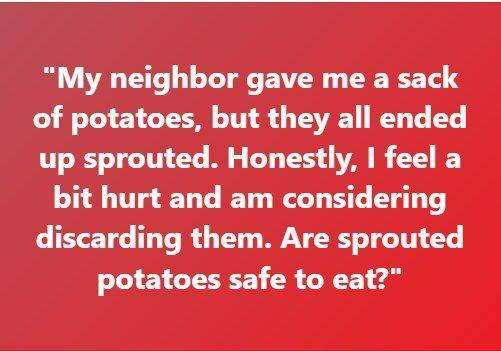Finding sprouted potatoes in your kitchen is a common occurrence, especially if they’ve been resting in the pantry for a bit too long. But the pressing question remains: Are they still okay to eat? Let’s delve into the details and see if sprouted potatoes are still safe to include in your meals and how to manage them safely.

What Happens When Potatoes Sprout?
Potatoes begin to sprout when tiny shoots, often known as “eyes,” start to emerge. This is the potato’s natural attempt to reproduce. Sprouting usually occurs from prolonged exposure to light, warmth, or simply because the potatoes have been kept for a while. While sprouting isn’t dangerous by itself, it does prompt concerns about the potato’s quality and safety.
The good news is, yes, you can still consume sprouted potatoes, but you’ll need to follow some safety measures.
Why Are Sprouted Potatoes a Health Concern?
Sprouted potatoes can pose health concerns due to increased levels of solanine. Solanine is a toxic substance that forms when potatoes are exposed to light or stored incorrectly. This toxin acts as a natural defense mechanism for the plant, yet in humans, consuming large quantities may lead to nausea, headaches, and digestive troubles. A green tinge on the skin of sprouted potatoes is often a sign of solanine presence.
How to Prevent Potatoes from Sprouting
Taking preventive steps is crucial if you want to keep your potatoes sprout-free. Here are some effective tips to extend their shelf life:
First, store potatoes in a cool, dark place, away from sunlight. Places like a cellar or a pantry are ideal. Secondly, keeping them away from onions can also slow down the sprouting process, as certain gases released by onions might accelerate sprouting in potatoes. Finally, try to purchase potatoes in quantities adequate for your immediate needs to avoid long-term storage.
Final Thoughts
To sum up, sprouted potatoes are safe to eat if you follow a few cautionary steps. Be sure to remove all sprouts and any green areas, inspect them for other spoilage signs, and cook them well to reduce any risks. If, however, your potatoes have extensive sprouting or show any spoilage evidence, it’s wiser to dispose of them to prevent any health issues. When uncertain, it’s always best to err on the side of caution.